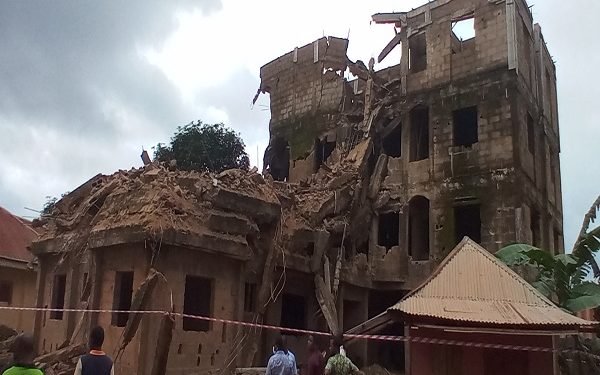Implementation of Survey Act, a panacea to building collapse
The state of building collapse and the aftermath of the numbers of deaths in Nigeria requires urgent attention. According to the Journal of Science and Engineering Production (pg 127-129), there were six instances of building collapse in 2009, 5 in 2010, 5 in 2011, 7 in 2012 and 2 in 2015. A report of Daily […]

FILE PHOTO: Building collapse
The state of building collapse and the aftermath of the numbers of deaths in Nigeria requires urgent attention. According to the Journal of Science and Engineering Production (pg 127-129), there were six instances of building collapse in 2009, 5 in 2010, 5 in 2011, 7 in 2012 and 2 in 2015. A report of Daily Trust edition of November 13, 2021 disclosed that there were 7 cases of building collapse in 2013, 2 in 2014, 2 in 2016, 8 in 2017, 2 in 2018, 12 in 2019, 27 in 2020 and 25 recorded in 2021. A report on www.guardian.ng.com on November 7, 2021 indicated that over 461 buildings collapsed in Nigeria in the last four decades with over 1,090 deaths recorded and many others injured.
More lives will be lost if appropriate measures are not taken to curb this man-made disaster as the number of building collapse cases is increasing at a fast pace. It is a general knowledge that construction begins from the foundation. It is important to note that the nature of the land determines to a large extent the nature of a foundation of buildings and other constructions including the land space.
- Amaechi and Emiefile: APCs shadow Presidential aspirants (III)
- Forum tasks APC on rewarding party loyalists
Land surveying is a technique used to get information through accurate measurements of an area before construction which will help to determine the best spot for a structure to be built and to monitor and maintain the structures when the construction is completed. This is done to prevent buildings and other physical structures from collapsing.
Building collapse may either be due to natural disasters such as earthquakes, hurricanes, floods or man-made factors also known as human errors as a result of poor design and construction methods because of poor or inadequate geospatial data. The major cause of building collapse in Nigeria is usually due to man-made factors.
Land surveyors in Nigeria have mainly been concerned with positioning, and production of maps, charts or plans. They are usually not involved in the building monitoring process. But a lot of the work done by surveyors in developed countries is monitoring related. They monitor buildings, railways, bridges, roads among others for deformation and correction.
Building survey helps to provide full assessment of the building’s condition. They provide the owners with the condition of a property, recording risks and potential expenditure that may be required, enabling them to develop the appropriate remedial or maintenance plans. It also identifies deterioration due to rising damp, penetrating damp, surface condensation or interstitial condensation. Building survey mainly aims to highlight areas of failure or concern, identify issues that need attention to prevent serious damage and present conservation and maintenance recommendations.
Land surveyors also have a lot of responsibilities in bridge construction projects. They usually assist the project engineers in making pre-construction surveys of an area to help determine the best spot for the bridge. Once a location has been determined, surveyors will make a more detailed topographic map. After the completion of the bridge, surveyors monitor the bridge’s structure during and after construction by attaching sensors to various parts of the structure. This enables them to be aware of any changes that occur as loads are added to the bridge. All these are processes used by surveyors to prevent buildings or structures from collapsing.
Nigeria will profit more in the scene of buildings and general construction if land surveyors are involved in the building and construction monitoring process as the rate of building collapse is alarming.
The federal government should give the necessary support to the Office of the Surveyor General of the Federation (OSGoF) in terms of the review of the Survey Coordination Act of 1962 and the implementation of its provisions in order to curb the violations of building and construction activities leading to collapses. It is a life-saving responsibility that the federal government must treat not with kid gloves.
Mustapha is a Corp member with the Press and Public Relations Unit, OSGoF, Abuja
